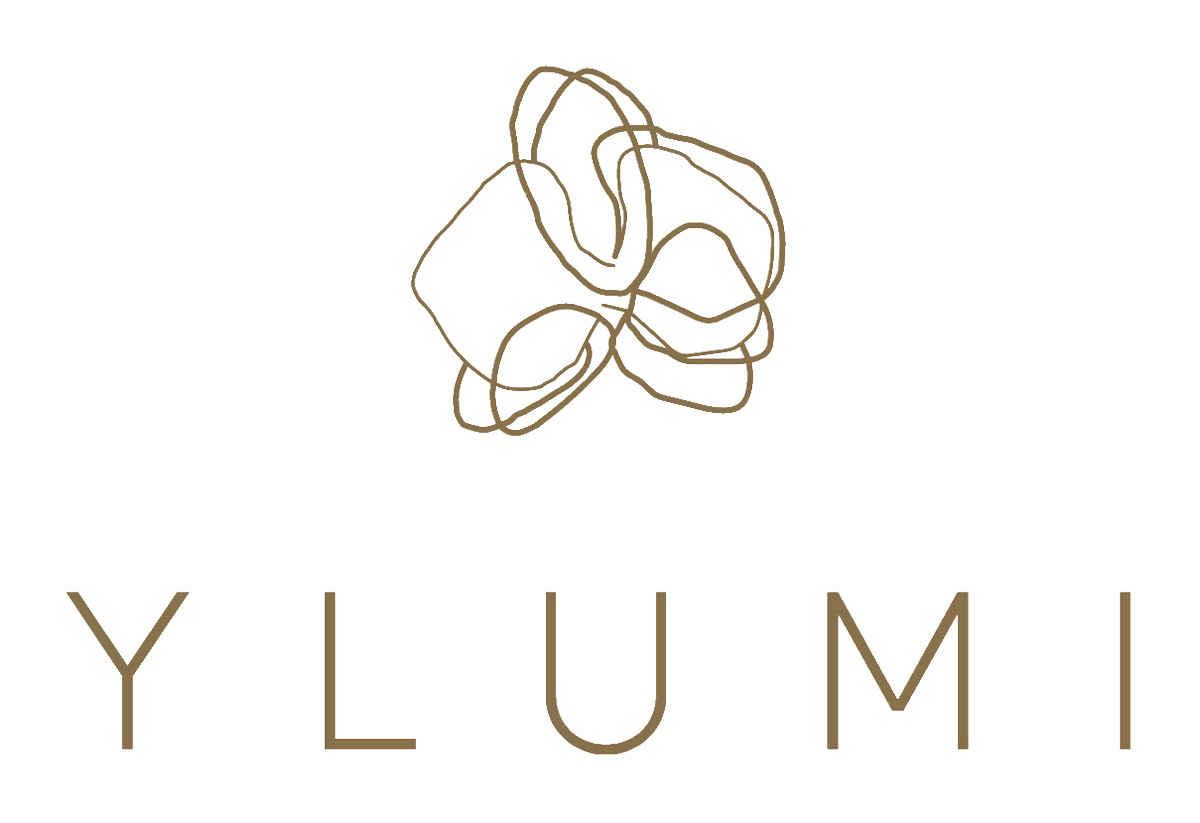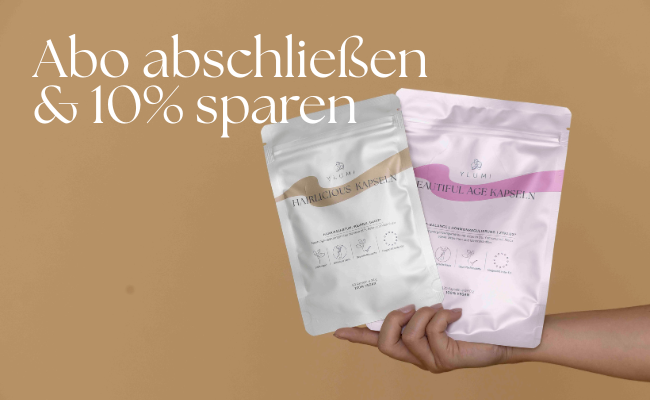
Vegan “Collagen”: What really works
Collagen – why it is so important for skin, bones & connective tissue
Collagen is the most abundant protein in the human body. It forms fibrous structures that make skin, bones, tendons, cartilage, and blood vessels both stable and elastic. Its characteristic feature is the triple helix , composed of chains rich in glycine, proline, and hydroxyproline. With age, its production and quality decline—visible through loss of elasticity, wrinkles, and drier skin. *
What is collagen – and what benefits does research show?
"Collagen" in dietary supplements is usually hydrolyzed collagen peptides (of animal origin) that are broken down into peptides/amino acids in the intestine. RCTs and meta-analyses report improvements in skin hydration, elasticity, and fine wrinkles after 4–12 weeks of supplementation. The effects are moderate but reproducible. **
Collagen production & skin elasticity: influencing factors
For endogenous (body’s own) collagen synthesis, the following are necessary:
-
Vitamin C is an essential cofactor for prolyl/lysyl hydroxylases (key to stable collagen helix). A deficiency slows collagen maturation; ascorbate can also stimulate collagen gene expression. ***
-
Amino acids (especially glycine, proline, lysine). They provide the basic structure of the triple helix. ****
-
UV radiation, oxidative stress, glycation, lack of sleep – all of these accelerate collagen degradation; antioxidants and lifestyle counteract this.
Is there “collagen for vegans”?
Plants don't produce collagen. "Vegan collagen" therefore usually refers to collagen boosters (nutrients that support the body's own production). At the same time, animal-free, fermentatively produced collagens (recombinant/animal-free) are being developed from yeast/bacteria or plant cell factories – currently available primarily in cosmetics; these are still rarely used as dietary supplements .
How does “vegan collagen” (booster) work?
Goal: Provide building blocks & cofactors, slow down collagen degradation.
- Vitamin C – Mechanism: Cofactor of hydroxylases, supports stable collagen fibrils. EU Health Claim: "Contributes to normal collagen formation for the normal function of the skin ."
- Amino acids (glycine, proline, lysine) – Mechanism: Structural building blocks of the triple helix; sufficient protein supply is the basis.
- Hyaluronic acid (HA) – Oral: RCTs show increased skin hydration after 2–12 weeks. (HA is not collagen, but supplements the skin's extracellular matrix.)
-
Plant extracts/mineral substances – Silicon (e.g., from bamboo/orthosilicic acid compounds): Studies indicate improvements in skin microrelief, elasticity, and hair/nail parameters when taken orally. ***** Centella asiatica (Cica/Gotu Kola): Stimulates fibroblasts and collagen synthesis ; clinical evidence is growing, although heterogeneous.
Vitamin C – the central lever
Vitamin C is biochemically irreplaceable for collagen maturation. Without ascorbate, proline/lysine are not sufficiently hydroxylated, and the helix remains unstable. Therefore, vitamin C is a mandatory ingredient in "vegan collagen concepts." (See above for the EU claim for skin/collagen.)
Food sources (suitable for everyday use):
Peppers, citrus fruits, berries, broccoli, kale, kiwis – combined with sufficient protein (e.g. legumes, tofu/tempeh, oats, seeds/nuts) to provide the necessary amino acids.Animal vs. vegan collagen – what does the evidence say?
-
Animal collagen peptides: solid RCT evidence for skin hydration/elasticity and fine wrinkles; not vegan.
-
Vegan "collagen boosters" : provide cofactor building blocks (vitamin C, amino acids, silicon, phytochemicals). The evidence is more indirect, based on mechanisms and studies on individual components (e.g., vitamin C claims; silicon RCTs; HA RCTs).
-
Fermentatively produced, “animal-free” collagen : technologically available (cosmetics), not yet standard in food supplements.
Short conclusion
Those who live a vegan lifestyle make sense by relying on booster concepts (vitamin C + protein/amino acids + silicon + HA + antioxidant plant compounds). Those who accept animal peptides can benefit from direct effects—the decision is ethically/nutritional.
Product recommendations:
-
-
YLUMI VANILLA GLOW PROTEIN / CHOCO GLOW PROTEIN: Plant proteins (rice/pea/hemp) provide amino acids for collagen synthesis; supplemented with vitamin C, biotin (contributes to the maintenance of normal skin), bamboo extract (a source of silicon), matcha, and spirulina. Ideal as a daily base—use cold in a shake or (in warm recipes) primarily as a protein source.
“Is vegan collagen a real alternative?” – the sober answer
-
Yes, as a booster approach: Vegan means stimulating the body's own synthesis instead of supplementing with collagen peptides. This is biochemically sound (vitamin C, protein, silicon, HA), and the evidence comes primarily from single-component studies.
-
No, if you expect identical evidence as for peptides: The data for animal peptides is currently more consistent – but not vegan.
-
Future: Fermentatively produced (“animal-free”) collagen could close the gap, but is not yet widely available as a supplement.
Practical timetable (vegan)
- Daily protein (0.8–1.2 g/kg body weight; mixed plant-based) – provides glycine/proline/lysine.
- Vitamin C (daily, through diet/product) – collagen formation .
- Oral hyaluronic acid (test for 8–12 weeks) – skin hydration .
- Silicon (e.g. bamboo/ch-OSA) – evidence of skin microrelief/elasticity .
- Antioxidant lifestyle (UV protection, sleep, stress management).
In short
Vegans can effectively support the body's own collagen production with protein + vitamin C + silicon + HA and antioxidant strategies. Those who want to remain consistently vegan can benefit from booster concepts. YLUMI offers suitable, vegan-oriented products that address precisely these aspects.
Sources (selection)
* PMC+1Journal of Experimental Biology ** PMC+1ScienceDirect
*** PMCMDPIScienceDirect
**** MDPI
***** PubMedPMC
Structure & Biochemistry: PMC+1
Vitamin C & Collagen: PMCMDPIEFSA Online Library
Collagen peptides meta-analyses: PMC+1
Oral hyaluronic acid (RCTs): PMC+1
Silicon (orthosilicic acid compounds): PubMedPMC
Plant extracts (Centella): PMC
“Vegan Collagen”/Fermentation: MedicalNewsTodayFoodNavigator.com -
-




